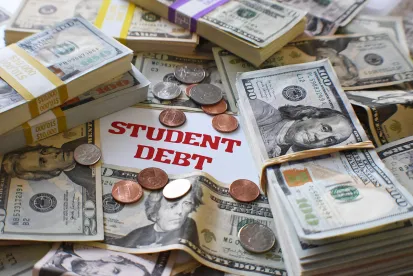On September 29, the CFPB released a special edition of Supervisory Highlights on student loan servicing practices of loan servicers and schools lending to students directly. The report highlights three notable findings related to transcript-withholding practices: Federal Student Loan transfers, and Federal Student Loan payment relief and cancellation programs:
-
Transcript Withholding Findings: As enders and educators, many educational institutions leverage their relationships with students by withholding transcripts from students delinquent on debt owed to the institutions. This practice creates a powerful mechanism to enforce payment demands, as consumers who cannot obtain transcripts could lose future educational- and job opportunities. The CFPB found that certain institutions have abused this practice of withholding transcripts as a blanket policy. In many circumstances, institutions have waited until consumers have paid their entire balances in full before releasing their transcripts and, in some cases, failing to deliver transcripts while continuing to collect payments, if the consumer was delinquent on a debt.
-
Federal Student Loan Transfers: In July 2021, two major servicers announced an end to their contracts with Federal Student Aid for student loan servicing, triggering the transfer of more than nine million borrower accounts. The CFPB identified significant consumer risks associated with the transfer of these loan accounts, including lost and incomplete borrower data that caused servicers to send inaccurate statements, borrowers to lose progress toward forgiveness, and problems in rectifying past billing errors.
-
Federal Student Loan Payment Relief & Cancellation Programs: Finally, the CFPB identified many cases of servicers improperly denying borrower applications for loan relief or cancellation through Teacher Loan Forgiveness or Public Service Loan Forgiveness (PSLF). In particular, examiners observed servicers misrepresenting eligibility dates and the requisite number of payments to qualify for relief. Servicers also provided borrowers with inaccurate information about their entitlement to progress toward loan forgiveness during the pandemic payment suspension.
Putting It Into Practice: This edition of Supervisory Highlights leaves educational institutions and student loan servicers with several takeaways.
-
Entities should review Bulletin 2022-03, Servicer Responsibilities in Public Service Loan Forgiveness Communications, which details compliance expectations in light of the PSLF waiver. As explained in the Bulletin, “After the PSLF Waiver closes, direct payments to borrowers may be the primary means of remediating relevant UDAAPs.”
-
Educational institutions should carefully evaluate the financial services they offer to ensure compliance with all appropriate consumer financial laws.
-
Servicers, in particular, should:
-
Engage in robust data-mapping exercises, including test transfers to minimize errors prior to a bulk transfer of loan accounts.
-
Monitor overall outcome data to identify potential unlawful practices, as delinquency rates and frequent denials on applications for payment relief may indicate violations of the CFPA.
-
Routinely approve applications for payment relief when they have all the required information to make decisions, even if that information is provided in a nonstandard format or across multiple communications.
-
Regularly monitor both the average time for application review and outlier experiences. Delays in processing forms can be unfair, even where they affect a subset of the portfolio.
-





 />i
/>i
